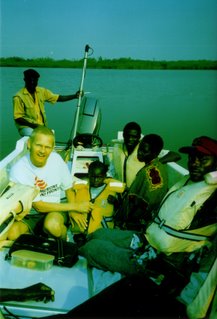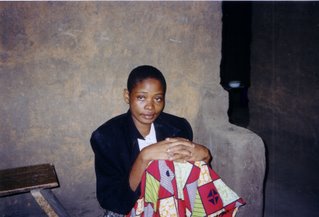Stories From The Field
FROM Zambia as Project Coordinator
David Murray is an HIV nurse from Bellevue Hill who has just returned to Zambia to work on an HIV project in Nchelenge Zambia. Last year David went on his first mission with Médecins Sans Frontières and he found it so rewarding he chose to return to the same project – but this time round David is working as the Project Coordinator.
Hi everyone
This is my first email to let you know what has been happening since I have been back -mostly project news. I had a really nice time back in Australia and appreciated all the kind support, and I have many fond memories to keep me grounded for the next six months.
Life here hasn't changed at all and I have managed to slip back into some normality with ease. Spent my Sunday today decorating my room as I haven't had anytime this week to do anything except work. One of my dear friends/housemate and work colleagues Sue is leaving tomorrow, she has just spent six months doing lots of fabulous work coordinating the psychosocial side of our program expanding the program from a core group of 5 VCT (Voluntary, Counselling and Testing) counsellors to 11 and getting the counsellors up to speed to cope with other complex counselling issues such as ongoing counselling, support groups, prevention of mother to child, adherence to antiretroviral treatment and dealing with the increasing impact of having more children in our program. So our team is putting on a barbecue (or brie) to send her off, so our house is a little busy at the moment with all of us preparing the food (marinated goat) and organising the logistics of keeping the beer cold!!!
One of the new changes for me has been the offer to be the Project Coordinator for the next six months. Its a very challenging position in a project of this size. So the last week has been very hectic for me trying to get my head around the current project issues that encompass so many different program components such as advocacy, logistics, malaria research, laboratory/technical, education, counselling, VCT, TB, ambulatory care clinics, home based care and of course the scale out and up of ARVs (including access to essential medicines). There have also been some interesting developments with a small flood of refugees from the Congo to one of the islands where we operate a program.
In my new role I still have time to be able to go out to the field and since I have been involved clinically with many aspects of the program I intend to have a hands on approach as much as possible, especially doing adherence counselling for people under ARVs. We now have 29 patients on ARVs (2 died recently) with another 30 selected to start in the next 2 weeks so its rolling along nicely. In many ways we have been just doing the work without a lot of fanfare but we plan to do a story to promote the project with the advent of the 100th person to start ARVs.
All in all life is good here, the people are great and the work rewarding.
Cheers, David
May 2004
FROM Zambia as Nurse
Dedicated to Frolance Besa who died from HIV/AIDS .
David Murray is from Sydney. He has been working as a nurse in Nchelenge, Zambia since January this year. This is his first mission with Médecins Sans Frontières.
I have been lucky enough to work with some really nice people here. Neetie, one of my housemates, who was working on the Malaria project, left last week. It is always sad to see people leave. And though you are sometimes very different people the experience of living and working so closely together binds you in some moment in time. I have learnt a lot from everyone who I have had the pleasure of living with. Rachel, the new ARV Doctor, arrived last week. Rachel and I will work very well together. She has lots of good ideas and is very enthusiastic. I am very pleased.
My next role within the project will be to work on the ARV side of the program developing a system and looking at requirements for compliance and counselling. The roll-out date seems to be getting longer, it might not be until November. There are plans for Rachel and I to go to Malawi to visit the Médecins Sans Frontières-France project there, maybe in late September.Next week I will be handing over over one of my catchment areas, Kabuta, to Emmanuel, a new Médecins Sans Frontières Clinical officer who starts on Monday. It is a strange feeling to hand over something that you have invested an enormous amount of time and energy in. But I am pleased that someone else will be able to take it that next step further. At the moment I am still going to Chisenga island one day a week. That will be a hard one to hand over as it is like my little baby. I have had some great breakthroughs there. I did some ongoing counselling with the caregivers there last week and it was so rewarding to see the fruits of my labour coming into being. So the next step for our project is to start support groups at the village level in each of the catchment areas. However a major obstacle is still the stigma of being HIV infected (people are fearful of publicly disclosing their staus within the villages). We are trying to encourage our caregivers to know who their HIV patients are and get them to come to the Well Care Clinics (HIV Clinics) with them. The support groups will be a further developement. Médecins Sans Frontières are currently running the Well Care Clinics, so another challenge is to get the Clinical officers who are employed at the Rural health center to take ownership of their clinics which can sometimes be very hard.
At the moment I am still going to Chisenga island one day a week. That will be a hard one to hand over as it is like my little baby. I have had some great breakthroughs there. I did some ongoing counselling with the caregivers there last week and it was so rewarding to see the fruits of my labour coming into being. So the next step for our project is to start support groups at the village level in each of the catchment areas. However a major obstacle is still the stigma of being HIV infected (people are fearful of publicly disclosing their staus within the villages). We are trying to encourage our caregivers to know who their HIV patients are and get them to come to the Well Care Clinics (HIV Clinics) with them. The support groups will be a further developement. Médecins Sans Frontières are currently running the Well Care Clinics, so another challenge is to get the Clinical officers who are employed at the Rural health center to take ownership of their clinics which can sometimes be very hard.
The caregivers there have informed me that they have had five patients publicly disclose their staus within the community, including one man in his local church. The reaction so far has not been too adverse and it looks like they are ready for support groups. I've been training with them, counselling and facilitating support groups with the aim of providing support groups in every village on the island. Then when someone comes for HIV testing and test positive, we can admit them straight away to our program and refer them to the local village support group. There has been such a wonderful feeling of seeing great change and mobilising the community to be proactive. And its not at all possible without the wonderful work of the voluntary caregivers.  I enjoy following the stories of my patients as it gives some personal meaning to the human face of HIV. One of my patients, who is very special to me, is a 24 year old girl who only recently tested HIV positive around the same time as having a miscarriage. She has such a beautiful energy, speaks english very well and is always very eager to know everything about her health. To my distress she has been very sick with pneumonia for weeks. She had PCP and TB Pneumonitis, a combination of two quite debilitating illnesses. Fortunately she seems to be picking up quite a bit.
I enjoy following the stories of my patients as it gives some personal meaning to the human face of HIV. One of my patients, who is very special to me, is a 24 year old girl who only recently tested HIV positive around the same time as having a miscarriage. She has such a beautiful energy, speaks english very well and is always very eager to know everything about her health. To my distress she has been very sick with pneumonia for weeks. She had PCP and TB Pneumonitis, a combination of two quite debilitating illnesses. Fortunately she seems to be picking up quite a bit.
It is nice to hear stories about individuals as opposed to lots of facts and figures. There are many other people whose stories are equally deserving like Charles and Mary (husband and wife couple) and Grace (widow of 5 children) in Kabuta. More on them later...
August 2003
Médecins Sans Frontières programs in Zambia focus primarily on refugees, who have arrived from neighbouring countries, particularly Angola and the Democratic Republic of Congo. Integrated HIV/AIDS care continues in the northern district of Nchelenge, including voluntary testing and counseling, home-based care, advocacy and education. Médecins Sans Frontières has been in Zambia since 1999.
COUNTRY PROFILE
ZambiaPopulation: 10,872,000
Life expectancy: 42 years
MSF expatriate staff: 16MSF national staff: 183

0 Comments:
Post a Comment
Subscribe to Post Comments [Atom]
<< Home